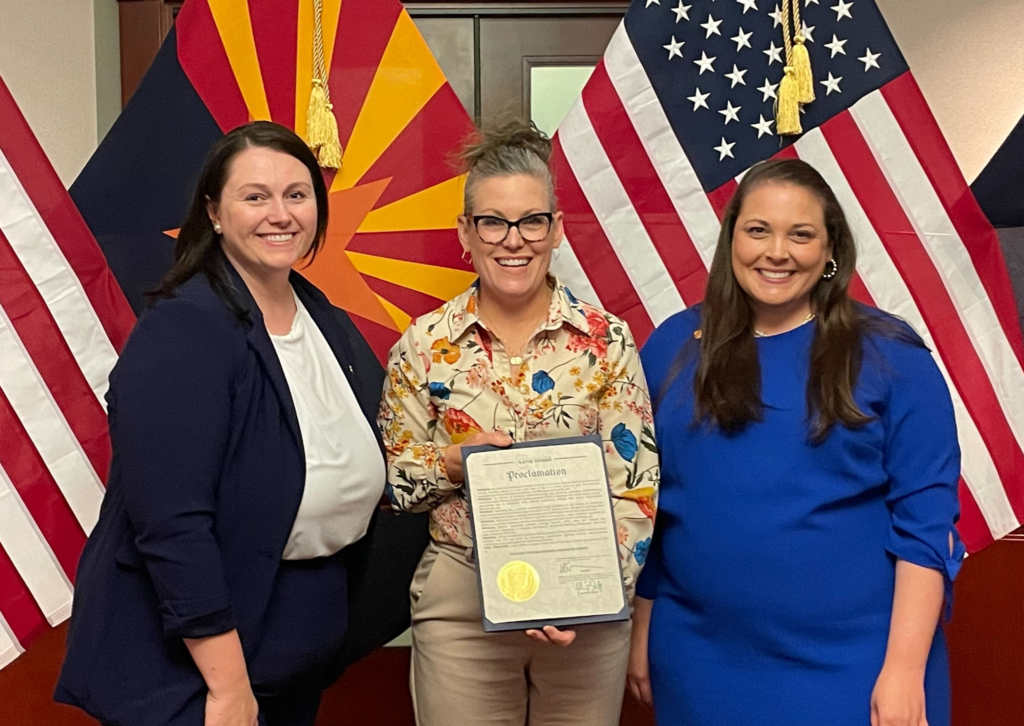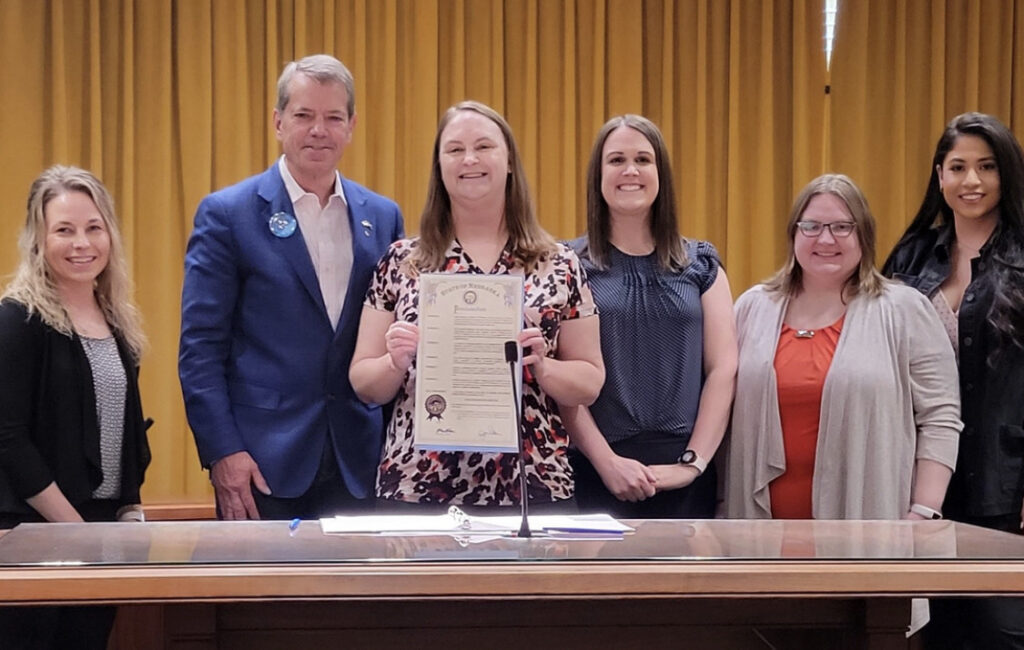Category: News & Events
Feeding Matters Approved for a $240,000 Engagement Award to Launch the Family-Centered Pediatric Feeding Disorder Research Consortium
Published by Feeding Matters on Feb 26, 2024
This project will focus on recruiting patient and family consortium members and leaders, training them on research fundamentals and the state of PFD research, establishing consortium governance, and then building consensus on a prioritized list of needed research for the field.
A team at Feeding Matters in partnership with University of North Carolina Wilmington has been approved for a $241,000 funding award through the Eugene Washington PCORI Engagement Awards (Engagement Awards) program, an initiative of the Patient-Centered Outcomes Research Institute (PCORI). The funds will support the launch of the Family Centered Pediatric Feeding Disorder (PFD) Research Consortium.
Jaclyn Pederson, MHI, CEO of Feeding Matters will co-lead the engagement project with Hayley Estrem, PhD, RN, Associate Professor at UNCW. Research on PFD is still considered an emerging field and while there has been great progress in recent years on the advancement of research, it still lacks the inclusion of the patient and family voice. PFD is impaired oral intake that is not age-appropriate and is associated with medical, nutritional, feeding skill, and/or psychosocial dysfunction. For these infants and children, every bite of food can be painful, scary, or impossible, potentially impeding nutrition, development, growth, and overall well-being. PFD is often a silent battle affecting more than 1 in 37 American children under the age of five annually. This prevalence surpasses that of well-known childhood conditions like cerebral palsy and autism.
This disorder places an extreme burden on parents/caregivers who must have specialized training in medical, therapeutic, and psychosocial interventions for every meal, often 5x a day or more. Despite this high level of involvement from families, they are often left behind in considering where the field of PFD is headed. Feeding Matters ensures that families always have a place at the table and aims to build a collaborative Research Consortium that will eventually be the field leader for the future of PFD research. To achieve this, Feeding Matters will launch the Family-Centered PFD Research Consortium to be co-created and led by patients and families themselves. Specifically, the project will focus on recruiting patient and family consortium members and leaders, training them on research fundamentals and the state of PFD research, establishing consortium governance, and then building consensus on a prioritized list of needed research for the field.
The launch of the Family-Centered PFD Research Consortium is part of a portfolio of projects that PCORI has funded to help develop a community of patients and other stakeholders equipped to participate as partners in comparative clinical effectiveness research (CER) and disseminate PCORI-funded study results. PCORI is an independent, nonprofit organization authorized by Congress with a mission to fund patient-centered comparative clinical effectiveness research that provides patients, their caregivers and clinicians with the evidence-based information they need to make better informed health and health care decisions. Through the Engagement Award Program, PCORI is creating an expansive network of individuals, communities and organizations interested in and able to participate in, share, and use patient-centered CER.
According to Greg Martin, PCORI’s Chief of Engagement, Dissemination and Implementation, “This project was selected for Engagement Award funding because it will build a community equipped to participate as partners in CER and develop partnerships and infrastructure to disseminate PCORI-funded research results. We look forward to working with Feeding Matters throughout the course of their two-year project.”
“The core values that guide our organization: inclusivity, innovation, and collaboration are not just ideals; they are the bedrock of every initiative we undertake as we strive to advance the field of PFD. Our latest endeavor, the PCORI project, epitomizes this commitment and resonates deeply with me professionally and personally,” said Jaclyn Pederson, CEO of Feeding Matters. “At Feeding Matters, we recognize that traditional research paradigms often overlook the invaluable insights that families can provide, based on their lived experiences. The establishment of the Family-Centered PFD Research Consortium is a pivotal step forward, ensuring that our efforts are not only collaborative but also deeply rooted in respect and input from the experiences of those we aim to serve,” Pederson concluded.
Feeding Matters’ project and the other projects approved for funding by the PCORI Engagement Award Program were selected through a highly competitive review process in which applications were assessed for their ability to meet PCORI’s engagement goals and objectives, as well as program criteria. For more information about PCORI’s funding to support engagement efforts, visit this link.
About Feeding Matters
For kids with pediatric feeding disorder (PFD), every bite of food can be painful, scary, or simply impossible to swallow, potentially impeding nutrition, development, growth, and overall well-being. Yet, there is no functional system of care for PFD locally, nationally, or internationally. That’s why Feeding Matters is dedicated to creating a world where children with pediatric feeding disorder will thrive. Established in 2006, Feeding Matters is the first organization in the world uniting the concerns of families with the field’s leading advocates, experts, and allied healthcare professionals to ignite unprecedented change to the system of care through advocacy, education, support, and research – including a stand-alone diagnosis, the International Pediatric Feeding Disorder Conference, and the Infant and Child Feeding Questionnaire. In 2022, Feeding Matters reached over 240,000 individuals in 50 states and 153 countries through their programs and website. To learn more about pediatric feeding disorder, visit feedingmatters.org or follow us on Facebook, Instagram and YouTube at @FeedingMatters.
Learn more about the Family-Centered PFD Research Consortium here.
Feeding Matters Receives Transformative Grant
Published by Feeding Matters on Jan 31, 2024
Feeding Matters recently received a generous grant from the Diane & Bruce Halle Foundation to transform early identification in Arizona and enhance world-wide awareness for pediatric feeding disorder (PFD). For a child with PFD, every meal becomes a source of anxiety and frustration. For families of children with PFD, parents feel like failures, isolated with their mental and financial health suffering with each bite they try to get their child to take.
This transformative grant will fuel a comprehensive 5-year strategic plan designed to revolutionize outreach and awareness for children with PFD, significantly enhancing early intervention (EI) and access to care. Leveraging existing partnerships in Arizona, the project will focus on collaborative intervention efforts, systemic initiatives, the launch of innovative awareness tools and the identification and elimination of barriers hindering children with PFD.
Families seeking specialized care for their children with PFD often confront extended wait times, resulting in delayed intervention and adverse health outcomes. With challenges in qualified team members and a lack of a PFD screening process, Arizona’s Early Intervention (EI) system faces hurdles in providing timely and effective care. The work this grant will allow aims to bridge these critical gaps by undertaking a comprehensive outreach and partnership strategy. This includes a focus on serving traditionally underserved communities, such as LatinX communities, low-income areas, and indigenous communities that often have challenges accessing feeding intervention.
Activities that this grant will enable:
- Arizona outreach and system advancements: Conduct targeted outreach to support early identification and resources for families.
- Launch several initiatives aimed to enhance early identification and increased access to services inclusive of strategic partnership, medical school partnership, an established screening process and quality assessment framework, and a family waitlist program.
- Awareness campaigns and educational tools: Launch the “It’s Not Picky Eating Campaign” leveraging social media, high-quality videos, and blog content. Develop infographics, a patient journey map, and a PFD documentary to increase public understanding.
- Publications and Resources: Revise the Family Guide with comprehensive and up-to-date information on PFD. Publish a book explaining PFD and allowing children with PFD to feel represented, seen, and included.
This support marks a watershed moment for Feeding Matters, with the potential to revolutionize the landscape of early identification and assessment not only in Arizona but globally. With an anticipated 30,000 individuals served in the first year and a commitment to exponentially grow its impact through targeted outreach, the project is not just about immediate change but represents a seismic shift in the landscape of early identification and assessment practices.
“The generous support from The Diane and Bruce Halle Foundation is a pivotal milestone in our ongoing mission at Feeding Matters. Through this transformative grant, we are strategically advancing our commitment to making pediatric feeding disorder (PFD) a household name by 2026. This game-changing project not only sets a new standard for early identification and intervention but propels us significantly closer to achieving our goal of widespread awareness. As we embark on this journey, these projects empower us to create a lasting impact, touching the lives of thousands of individuals and fostering a legacy of awareness and support that will resonate for years to come,” shared Jaclyn Pederson, CEO of Feeding Matters.
About Feeding Matters
For kids with pediatric feeding disorder (PFD), every bite of food can be painful, scary, or simply impossible to swallow, potentially impeding nutrition, development, growth, and overall well-being. Yet, there is no functional system of care for PFD locally, nationally, or internationally. That’s why Feeding Matters is dedicated to creating a world where children with pediatric feeding disorder will thrive. Established in 2006, Feeding Matters is the first organization in the world uniting the concerns of families with the field’s leading advocates, experts, and allied healthcare professionals to ignite unprecedented change to the system of care through advocacy, education, support, and research – including a stand-alone diagnosis, the International Pediatric Feeding Disorder Conference, and the Infant and Child Feeding Questionnaire. In 2021, Feeding Matters reached nearly 200,000 individuals in 50 states and 143 countries through their programs and website. To learn more about pediatric feeding disorder, visit feedingmatters.org or follow us on Facebook, Instagram and YouTube at @FeedingMatters.
About The Diane & Bruce Halle Foundation
In 2002, Bruce and Diane Halle founded the Diane & Bruce Halle Foundation to extend that sense of caring to the larger community. The Halle Foundation now serves as a statewide leader in providing philanthropic resources for organizations working in the fields of human services, health & medical, education, arts & culture, and spirituality. The Halle Foundation identifies and funds outstanding nonprofits to ensure that all people can build healthy, productive, and inspiring lives.
Behind the headlines: Exploring the complex world of tongue tie releases and pediatric feeding disorder
Published by Feeding Matters on Jan 29, 2024
A tongue tie release procedure (frenectomy or frenotomy) is increasingly prevalent among children with pediatric feeding disorder (PFD) that the majority of them have had it, or their parents at least considered it.
That’s because difficulty breastfeeding is common among children with PFD. A frenectomy is often considered an early treatment to improve latching while breastfeeding.
Breastfeeding is a complicated process that doesn’t come naturally to all mothers and babies. It takes multiple muscles, the ability to coordinate sucking and breathing and the strength to stay awake through strenuous exercise. Releasing a tongue tie can seem like an easy fix.
But for kids with PFD, a frenectomy doesn’t necessarily fix feeding problems and is instead one step along a journey of treatment when the frenulum is not the sole cause for feeding dysfunction. For some babies, a frenectomy can be helpful. For others, it’s not necessary. And in some rare cases, the elective procedure causes harm. While generally safe and often performed by dentists, the procedure maintains the potential to do harm, without a significant assurance of benefit. The procedure is sometimes not covered by insurance and can cost hundreds of dollars.
The debate about releasing tongue ties recently was brought to the forefront in The New York Times article, Inside the Booming Business of Cutting Babies’ Tongues. Showcasing many cases where the procedure was unnecessary or went wrong, the article paints a picture of a procedure as controversial as it is common.
Tongue tie releases for children with pediatric feeding disorder
What’s clear from working with countless families of children with PFD is the benefits of a frenectomy vary on a case-by-case basis. Most importantly, it should never be a result of a self-referral to a clinician who advertises the procedure as the obvious answer for breastfeeding difficulties. Instead, the decision should be shared by the family and a qualified clinician.
Nikhila Raol, MD, MPH, pediatric ENT and an associate professor at Emory University School of Medicine who researches ankyloglossia, or tongue ties, says getting the procedure is a multifactorial decision, meaning it
takes careful consideration with advice from multiple clinicians working together. “Even when the tongue tie is physically obvious, I’m still a proponent of having a functional evaluation with a feeding therapist or lactation consultant with real expertise in evaluating feeding and latch before a procedure. What I’m finding in my ongoing research is that even if a baby has a tongue tie, if the mother’s breast shape is favorable, it may not cause as much issue as we think,” she says.
Breastfeeding often takes some time for babies and moms to adjust. Dr. Raol recommends most parents wait at least two weeks to a month of trying ways to adjust to breastfeeding before getting a frenectomy on a newborn, assuming that the weight gain is acceptable. “Sometimes, you just have to give the baby time to figure it out and the mom’s body to adjust to breastfeeding. Figuring out how to latch and how to get a strong suck sometimes just get better with time,” she says.
Jaclyn Pederson, CEO of Feeding Matters, sees many parents consider the benefits of a frenectomy when breastfeeding or picky eating is challenging. As a parent, she did the same and released the tongue tie on one of her sons. She says that while a tethered tongue is a concern, what can get lost is the nuance that it’s one concern of many –– especially when a child is diagnosed with PFD. “What we know about PFD is that it’s incredibly complex. One of the first things that we share with families is helping them understand that there’s not just going to be a switch that’s flipped to make their feeding journey easier. It’s a series of small milestones that build over time,” she says.
The challenge of considering a frenectomy as a quick fix to difficulty breastfeeding is not just disappointment when it doesn’t work. It can mean overlooking the actual root of the problem, such as some other problem with feeding or swallowing. “Assuming that the surgery is the solution, even as minimal of a procedure as it is, still leaves out a lot of other feeding components,” says Pederson.
One family’s tongue tie release story
When Emily Garlinsky’s son, Landon, had trouble breastfeeding, she was at first confident a tongue tie wasn’t the issue. Clinicians in the hospital when he was born, as well as her pediatrician, assured her his tongue looked normal.
But as Landon continued to struggle and Emily shared her feeding frustration in Facebook groups, she kept hearing people recommend a tongue tie evaluation. By the time Landon was four months old and still struggling to feed, Emily thought it was time to revisit the issue. Landon was already in feeding therapy at that point, and his therapist agreed the procedure might help.
Emily went to a pediatric dentist who told her Landon had a lip tie and a tongue tie. Landon underwent the procedure, but his feeding didn’t improve. He did well with the surgery, though, and Emily is glad they did the release. “There’s a lot of back and forth on Facebook groups from people who regret it. It didn’t help with feeding for us, but other aspects of the release are helpful for speech,” says Emily.
True or false? Tongue tie myths
Dr. Raol warns against peddling fear to encourage parents to act for their babies or overpromising treatment results. “You must be careful because breastfeeding mothers are a vulnerable population. A new mother just wants to do her best,” she says.
Following are some common assumptions around tongue tie release procedures. Some have no research evidence to support them, and others have emerging research.
Tongue ties cause swallowing difficulties: Maybe
Dr. Raol is rigorously studying this in her research. She says, “When you swallow, your tongue starts the pharyngeal squeezing process. When a child can’t squeeze hard, we think this could cause food or liquid to spill into the airway as it is trying to enter the esophagus.”
Tongue ties cause reflux: Unknown
Reflux is normal in babies due to low tone of the sphincter muscle that separates the stomach from the esophagus. Dr. Raol explains that it has never been objectively demonstrated that a tongue tie is responsible for this through aerophagia, or swallowing air, which is the proposed mechanism. However, some studies have shown that reflux symptoms improve after frenectomy. What we do not know is if the symptoms would have just gotten better with time.
Tongue ties cause problems with craniofacial development: Maybe
There’s not a lot of existing research evidence to support this. More research is needed.
A laser is better than clipping for a tongue tie release: Maybe
Many parents hear on social media advice to go to a pediatric dentist instead of an ENT for a tongue tie release because dentists use a laser.
More research is needed, but a review of the existing research found the laser procedure resulted in a shorter surgery, without suturing, and less postoperative pain.
Tongue ties cause speech issues: Maybe for some
The jury is still out on this because Dr. Raol explains there is a deficiency in the literature. Most of the research comes from English-speaking countries, but there’s a difference in how the tongue works in other languages. “In Indian languages, we use the tongue a lot more with certain sounds where you put your tongue far back on the palate. In India, the primary reason kids get a frenectomy is for speech.”
For serious speech issues, though, says Dr. Raol, a tongue tie release is not a quick fix. “In the case of expressive aphasia or something like that, we should not be telling families that clipping a tongue tie will solve that problem,” she says.
You should go to a pediatric dentist for a frenectomy: Only with a diagnosis or consultation from an ENT, lactation consultant, feeding skill specialist, or pediatrician first –– and in that case, the ENT or a pediatric dentist could do the procedure
Breastfeeding is complicated, and any issues should be evaluated by an expert who considers both the baby’s and the mother’s anatomy. Misdiagnosing a tongue tie as the issue can mask other underlying problems, such as PFD.
While it’s true that a frenectomy is a minor surgery and a trained clinician can safely manage the procedure, it still requires careful consideration.
Be wary of a clinician who promises the procedure as a quick fix in exchange for out-of-pocket payment.
Signs your child might need an evaluation from a feeding therapist or lactation consultant
While some children’s tongue ties are apparent even to the untrained eye, it’s still important to get a thorough evaluation before scheduling a frenectomy. Under no scenario should you self-refer or decide based on advice from a friend or a clinician on social media. While this may seem obvious, many people are doing just that and then paying cash for the elective procedure. “We’ve seen this become the number one thing families are thinking about when they have trouble breastfeeding because they hear their friends talk about it and see it online,” says Pederson.
Following are some signs your child might be a good candidate for a frenectomy:
- Your child is not steadily gaining weight from breastfeeding.
- There is some tongue tethering.
- Pain while breastfeeding goes beyond the initial adjustment period.
- You’ve tried various positions and breastfeeding techniques.
- The number of times your child feeds per day remains the same over time. Your baby should become more efficient at feeding as she grows.
When seeking the right clinician, Pederson recommends starting with your pediatrician and an ENT, who will conduct a thorough evaluation. “Look for a professional who shares the pros and cons of a scenario versus one who pushes a treatment as the answer to everything. Explaining the nuance is how you know that a professional really understands how complicated tongue ties are and the issue of feeding is in general,” she says.
Like any treatment or therapy for children with PFD, managing feeding requires a degree of personalized medicine. “Some kids really do need a frenectomy. But if all I have is a hammer, everything is a nail. The tongue is just one piece of the puzzle,” says Dr. Raol.
In the end, getting even a minor tongue tie release surgery is a decision parents should make based on clinical advice, says Dr. Raol. “If you’ve tried everything, and there does seem to be some tethering, and you’re fully aware that this may or may not help, then I don’t think the procedure is unreasonable.”
Feeding Matters blog posts are written by the communications team at Feeding Matters and designed to continue the conversation and awareness around pediatric feeding disorder based on expert opinion interviews.
Unlocking Hope: Join the Feeding Matters Family-Centered PFD Research Consortium
Published by Brandt Perry on Feb 12, 2024
Are you a parent or caregiver navigating the complexities of Pediatric Feeding Disorder (PFD)? If so, you’re not alone. As a parent of two children facing these challenges, I intimately understand the hurdles that come with this condition. I’m thrilled to share an exciting opportunity that could reshape the future for families navigating PFD – the Feeding Matters Family-Centered PFD Research Consortium.
Understanding the Landscape
Feeding Matters, an organization close to my heart, is a world leader in the PFD field. Having actively volunteered and chaired the Family Advisory Council, I’ve witnessed firsthand their dedication and impact. Now, the Feeding Matters is taking a significant step forward with the Feeding Matters Family-Centered PFD Research Consortium.
A Personal Stake in Progress
As a parent deeply involved in this initiative, I am serving as the Primary Family Stakeholder Consultant. Leveraging my personal experiences, I’m working to ensure that the Consortium’s efforts authentically reflect the needs and perspectives of families like ours. This unique approach, engaging PFD families from the beginning, underscores Feeding Matters’ commitment to family-driven care and patient-centered research.
Consortium Goals Aligned with Transformation
The Consortium’s objectives are essential for progress. From member training to consensus on research priorities and sustainable engagement, each goal aligns seamlessly with the mission and values of Feeding Matters. Joining the Feeding Matters Family-Centered PFD Research Consortium means contributing to transformative PFD research and improving outcomes for our children and families.
Join the Movement
This Consortium is more than a research initiative; it’s a beacon of hope, empowerment, and collaboration. By participating in a research project, you contribute valuable insights that will use to develop more effective therapies, diagnostic tools, and support systems for families navigating the complexities of PFD. Your involvement can drive positive change in the lives of countless children and their parents.
By becoming a part of this vital endeavor, you’re actively contributing to a movement that has the potential to redefine the future for families dealing with PFD.
How can get involved?
- Become a Consortium Member: Join a community of parents, caregivers, and advocates dedicated to making a difference in the PFD landscape.
- Spread the Word: Share this opportunity with your network. The more families we involve, the greater the impact.
- Stay Informed: Subscribe to Feeding Matters updates to stay informed about the consortium’s progress and other PFD-related developments.
- Connect on the Feeding Matters App.
Conclusion
Join me and countless others in supporting the Feeding Matters PFD Research Consortium. Together, let’s unlock hope, drive empowerment, and foster collaboration. We can contribute to a brighter and more informed future for our kids.
For more information and to join the Feeding Matters Family-Centered PFD Research Consortium, visit feedingmatters.org/consortium
Bidding Farewell to 2023
Published by Feeding Matters on Dec 18, 2023
Celebrating 2023 at Feeding Matters and getting one step closer to creating a world where children with PFD will thrive.
A lot can happen in 365 days. And with the collaborative work of our dedicated team, the unwavering commitment of our volunteers and partners, and the generosity of our donors, we can make a huge impact in just one year.
At Feeding Matters, we’ve always emphasized the importance of celebrating every milestone, no matter how small or large. As we wrap up this remarkable year, let’s take a moment to revel in the accomplishments that fill us with pride and gratitude.
Family Support
Ensuring that no family walks the path of PFD alone has always been at the core of our mission. This year, we’ve taken significant steps to fortify our Family Support programs and ensure they remain effective and trauma-informed for years to come. Highlights include:
- Launching an initiative to transform our Family Support programming from a trauma-informed len.
- Supporting four families through the Family Assistance Program, which provides direct financial support to families in the throes of PFD
- Extending support to over 420 families through our family coaching programs, including over 150 Power of Two matches
- Empowering over 3,800 individuals through our Family Guide to PFD
- Creating memorable experiences with Family Experience Photo Shoot Events in Arizona
Education
Our commitment to collaborative care for PFD has driven us to provide comprehensive education to professionals and families alike. This year’s achievements include:
- Hosting our 2023 International PFD Conference, reaching over 1,000 individuals from 65 countries which was the most number of countries that had ever attended
- Delivering impactful presentations at national conferences, international conventions, and local universities
- Empowering over 4,000 individuals through our PFD tool kit
- Reaching over 7,500 individuals with our ARFID and PFD infographic
Research
Igniting research and supporting the transition from evidence informed practice to evidence based practice has been a pivotal focus. This year, we’ve made significant strides by:
- Publishing our research in Child: Care, Health and Development on the landscape of treatment options for children with PFD
- Launching and facilitating the PFD/ARFID Consensus Summit
- Ensuring that families have a significant role in shaping the future of PFD research.
Advocacy & Outreach
Our advocacy and outreach efforts work to give a voice to those who need it most and to create ripples of impact as we work to make sure PFD becomes a household name by 2026. Highlights include:
- Hosting our first-ever Arizona Signature Event, Feed the Cause, raising over $109,000 from the generosity of our Arizona community
- Strengthening our presence in local communities, including Ohio, Southern California, and Arizona with the incredible passion from our Community Councils and on the ground volunteers
- Increased our digital footprint to spread awareness about PFD and how individuals can seek help
- Conducted a highly successful PFD Awareness Month, featuring our inaugural PFD Awareness Month fundraising campaign, “Call it PFD,” raising over $21,000
- Sharing 12 new PFD stories on our website to spread awareness and ensure families do not feel alone when facing PFD
Overall, 2023 has been a year of growth, progress, and preparing. We expanded the number of staff and volunteers, diligently followed our strategic plan, and embraced collaboration to build meaningful partnerships. Achieving the Candid Platinum Transparency Seal from GuideStar and receiving a clean financial audit status further demonstrates our commitment to excellence and to children with PFD.. We’ve had a successful year and are looking forward to even more Family Support, Education, Research, and Advocacy next year as we build the future we want to see, one milestone at a time.
Thank you for being an essential part of our Feeding Matters family and for celebrating with us.
Thoughts from the Airport after the ASHA Convention
Published by Jaclyn Pederson, MHI on Nov 20, 2023
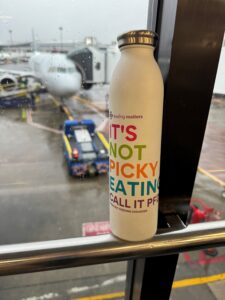
This week took my breath away. Something I’m working on in my own leadership journey is taking the time to celebrate and acknowledge success as sometimes I’m moving too fast to do so. And this week while attending the ASHA Convention, Igniting Innovation, I was able to witness first-hand the growth of our PFD movement…and it blew me away. So during the convention, and now with all of you, I am celebrating the moment.
I’ve been around Feeding Matters for a long time, but not always in this position. I was here when our founder, Shannon Goldwater, first presented the idea to create a stand-alone name and identity for the broad spectrum of feeding difficulties in 2015 to our PFD Alliance (previously Medical Professional Council). I was around to coordinate the flights and hotels to make sure leaders were there for the consensus meeting in Phoenix in 2016, around in 2017 and 2018 to help “herd cats” to keep the PFD Consensus publication moving, and around to plan and listen to the community to build a strategy for our PFD identity movement in 2019 and beyond. Even though I’ve been involved in the planning and execution of all of this, I don’t think I fully comprehended the impact that it would create years down the road, like now in 2023. Some dreams are so big they feel like a hazy image instead of a clear picture.
Some dreams are so big they feel like a hazy image instead of a clear picture.
But this week that image became a little clearer. I was in awe as I saw the representation of SLPs specializing in pediatric feeding overwhelm any room they entered, I was proud as I saw discussions of what emerging research is happening in PFD (and it’s a lot), I was curious as I listened in on brainstorming of what is needed to better support feeding specialists. I heard ideas of what we can be doing better and what we are doing well. And overall, I felt overwhelmed at the sheer growth and the familiar way that PFD is now discussed at a non-feeding specific convention. PFD as a name didn’t exist until 6 years ago. Now, it is commonly used amongst professionals from many different disciplines, backgrounds, and geographies including SLPs, OTs, MDs, and many more. I am in awe. It was the stuff of dreams.
If this week is any indication of the many other important disciplines involved in PFD and the direction this entire community, not just our SLP friends, is headed with our PFD movement, we have an unbelievable journey ahead.
Overwhelmed with gratitude and in awe with excitement– that’s how I’d describe the week. Thank you to all of you I saw and to those I didn’t get a chance to say hello to. And thank you for your passion and partnership to turn these big, hazy dreams into reality.
Advancing Feeding Matters: A Report from Dublin and London
Published by Jaclyn Pederson, MHI on Jul 13, 2023
Greetings, Feeding Matters Community! It’s with great pleasure that I bring you an exciting update on the summer awareness travels of the Feeding Matters team. As Feeding Matters’ CEO, I had the privilege of attending the International Family Nurses Conference alongside our Program Manager, Heidi Van der Molen. Our mission to raise awareness and enhance support for families facing pediatric feeding disorder (PFD) took center stage as we engaged with esteemed professionals, discussed key concerns, and explored opportunities for collaboration.
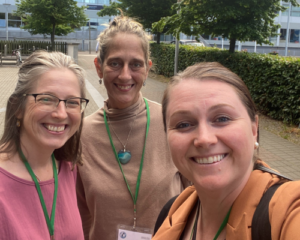
Feeding Matters’ Power of Two: Empowering Parents, Transforming Lives
During the International Family Nurses Conference in Dublin, Heidi and I had the honor of presenting on Feeding Matters’ “Power of Two” program. We shed light on the incredible impact of parent-to-parent support in the PFD community, emphasizing the significant role it plays in helping families navigate their feeding concerns. By sharing personal stories, challenges, and triumphs, we showcased the power of connections, empathy, and knowledge exchange in transforming lives. It was truly inspiring to witness the positive response and engagement from healthcare professionals and fellow attendees. If you are interested in sharing this program with your families or participating as a family member yourself, please visit our family support roadmap to learn more.
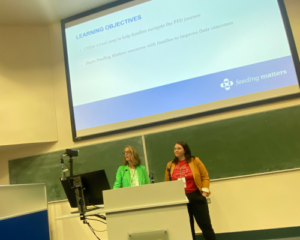
Addressing Top Feeding Concerns: A Pathway to Support
As part of our presentation in Dublin, we highlighted the “top feeding concerns” that parents often encounter when they find Feeding Matters. By understanding these concerns, we aimed to equip healthcare providers and families with valuable insights into common challenges faced by children with PFD and the struggles that families often face as they work to ensure their children are growing. By sharing our expertise, resources, and evidence-based strategies, we are committed to nurturing a supportive environment that fosters positive outcomes for children with PFD.
Leading the Way with Research and Tools
Feeding Matters’ dedication to research and the development of practical tools was also showcased through our poster presentations at the conference. One poster focused on our comprehensive Feeding Matters family guide, a valuable resource for families seeking guidance on managing PFD. The family guide, available here, is a great tool to any parent on the PFD journey. The second poster highlighted our Infant and Child Feeding Questionnaire and the research to identify 6 questions to facilitate early identification of PFD. These initiatives demonstrate our commitment to bridging the gap between research and practice, ensuring that families receive the support they need.
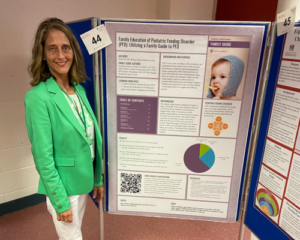
Collaboration and Advocacy on an International Scale
In addition to the informative sessions, we had the opportunity to connect with various partners, potential collaborators, and researchers from around the world. Engaging in insightful discussions, we explored ways to advance the field of pediatric feeding disorder and promote early intervention strategies. Notably, I had a productive meeting with Natalie Morris, the Founder and CEO of the Feeding Trust in London. Our discussion focused on the growing challenges related to Avoidant/Restrictive Food Intake Disorder (ARFID) and PFD in the UK. Together, we aim to enhance awareness, understanding, and pathways for assessment and treatment in the medical professional community and families alike.
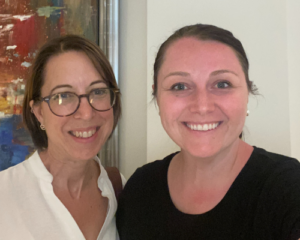
Looking Ahead: Our Commitment to Progress
As we reflect on the events in Dublin and London, it’s evident that Feeding Matters is playing a pivotal role in raising awareness and fostering change within the PFD community. But we know that we are not the only ones. We have been excited and grateful as we’ve seen a huge increase in presentations about PFD at major conferences across the country and world. Together, we can continue making strides towards a future where every child has the opportunity to thrive.
Feeding Matters’ journey to Dublin and London has been a great chance to talk about PFD, build partnerships, and focus on collaboration and research. Through our impactful presentations, informative posters, and meaningful conversations, we have expanded our network, shared our expertise, and advocated for improved support systems for families facing pediatric feeding disorder. As we move forward, we are more determined than ever to drive positive change, empower parents, and advance the field of PFD so that all children with PFD will thrive.
